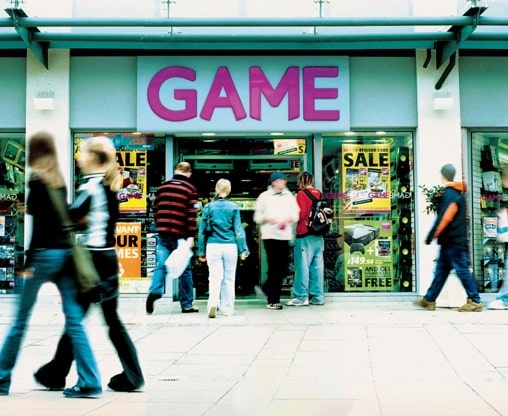
After suspending shares last week, Europe’s largest plastic-box video games retailer, Game Group, called in administrators to run the company on Monday.
PwC promptly shut 277 of its 609 UK and Ireland stores, making 2,104 out of 5,126 staff redundant, but said “a number of parties have expressed an interest in purchasing part or all of the business and assets of the group”.
It didn’t have to be this way. paidContent understands Game Group, three years ago, sought strategic proposals for survival in the years ahead…
- Executives were given a strategy that made clear the industry would see a tipping point from physical to digital game distribution in 2012.
- In response, the strategy recommended cutting down on bricks-and-mortar store count.
- And it made suggestions for using the Game brand to power digital storefronts on PC, console and other platforms.
But paidContent understands Game, under then-CEO Lisa Morgan, did not adopt the strategy, deciding instead that such an advance was not necessary.
At a time when Game was being urged to swap bricks for clicks, it made an even bigger foray in to the high street by acquiring Gamestation. Now it is not uncommon, in some towns and cities, to find two Game stores and an additional remaining Gamestation just a few streets apart.
And Game has been caught in a perfect storm…
- Reliant on console hardware, it has hurt as Microsoft (NSDQ: MSFT), Nintendo and Sony (NYSE: SNE) have introduced new input peripherals but not new machines.
- Dependent on A-list titles and Christmas software sales, it has watched as consumer spending has been impacted and as game choice has contracted around a few, expensive-to-produce franchises.
- Game’s innovative pre-owned retail channel has also made frenemies out of some publishers, which have limited certain features only to first-time buyers or, latterly, subscribers.
Game publishers are more bullish than ever about the prospects for generating such in-game revenue directly from players. And a growing number of titles is available through Xbox Live Arcade, for example.
But the console sector is not yet ready to wholeheartedly abandon plastic-box distribution – tier-A titles are priced at a hefty premium over even the pricey equivalents stocked on Game’s shelves.
That does not necessarily mean a console opportunity for Game, however – although it launched a PC download service, the console retail channel is locked up for operation entirely by the console makers.
In the remaining space, Game recently introduced a version of a digital strategy of its own…
- Selling points cards for Facebook Credits, Zynga games, Xbox Live and Playstation Network.
- It has also tried to secure publisher agreement for exclusive digital content access with boxed titles sold in Game.
- In October, it introduced its own system for online game transactions, GameWallet, adopted sparsely.
- And it had also sought an early foothold in the OnLive cloud game service.
In 2010/11, Game’s digital revenue increased by 27 percent to £41 million.
But, having passed on the earlier digital opportunity, it seemed too little, too late. Now administrators’ priority is likely to strip significant high street presence out of the company, especially where duplication occurs around the UK.
“The group has faced serious cashflow and profit issues over the recent past,” PwC’s joint administrator Mike Jervis told investors. “It also has suffered from high fixed costs, an ambitious international roll-out and fluctuating working capital requirements.
“Despite these challenges, we believe that there is room for a specialist game retailer in the territories in which it operates, including its biggest one, the UK. As a result we are hopeful that a going concern sale of the business is achievable.”
Game’s young staff have always been very helpful and knowledgeable in my experience. Gamers should hope that many of them get to carry on working in a right-sized high street retail business that can go on selling games on discs, until either the industry truly tips to digital or Game can forge a digital path of its own.
Well there we have it. Just had the phonecall to say Game is in adminstration and I have now been made redundant.
— Heather Lawrence (@exeliax) March 26, 2012
Just evacuated all customers an told to close store #GAME
— kyle alleyne (@daddyka89) March 26, 2012
Just been made REDUNDANT KMT #GAME full of shit
— kyle alleyne (@daddyka89) March 26, 2012
Yup, been made redundant. Just been told I need to work out the week to help pack up and my Game store is closed for good…
— Jordan Cormican (@JrdRIOT) March 26, 2012
One sad thing about GAME is that so many young people will be made redundant. Many work lives start there – this isn’t a nice start.
— Alex Donaldson (@APZonerunner) March 26, 2012
So a friend just got made redundant a few minutes into her shift at GameStation. it’s going well then. #GAME
— Jennifer Taylor (@littlejuicebox1) March 26, 2012
Very sad day indeed.Forever proud of my former GAME and gamestation colleagues who have shown such dignity and fought so hard
— Ian Shepherd (@IanAShepherd) March 26, 2012
It breaks my heart to see a business made up of such magnificent people come to this and yes, I think we should have been able to avoid it.
— Ian Shepherd (@IanAShepherd) March 26, 2012
@GeorgeMacD thanks George, I’ve appreciated the feedback today but no getting away from the fact that this happened on mywatch.
— Ian Shepherd (@IanAShepherd) March 26, 2012